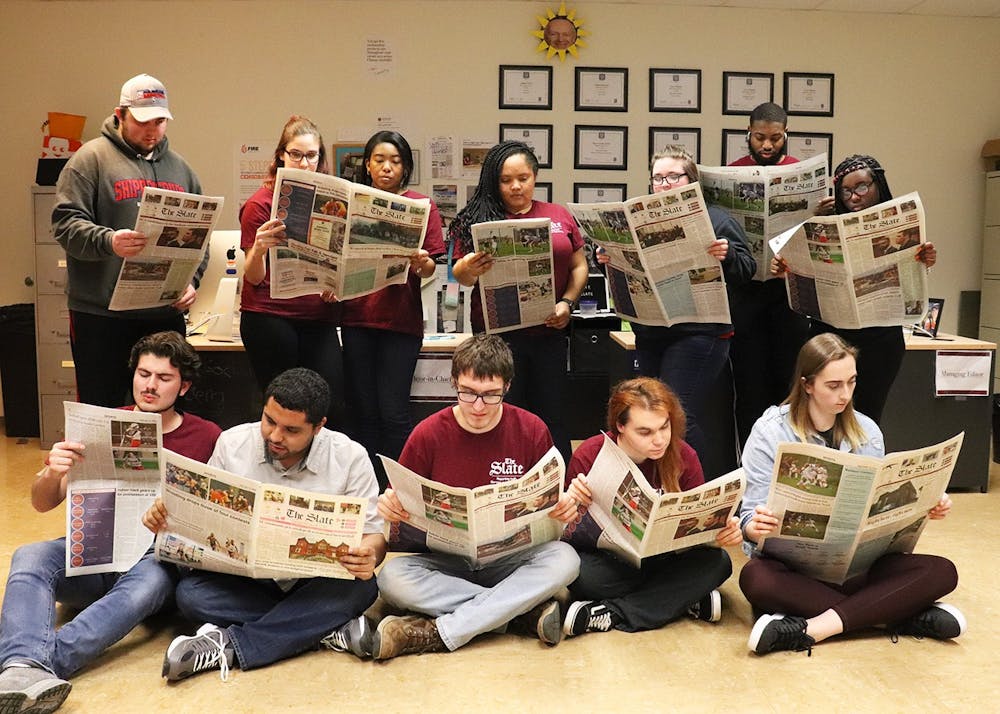We are at the end of another year, and a new team is about to take over and lead The Slate. They take the place of a departing generation of graduating veterans of which I am proud to be a member.
The value of The Slate, and student journalism, has presented itself numerous times throughout this academic year. From informing students how their money is being spent to telling the community why fire trucks are outside Franklin Science Center, we are the voice of the students. As journalists, we are the ultimate check on those with power on our campus. My staff has relentlessly pursued these objectives through a global pandemic which has “complicated” the completion of our coursework. Still, the fire of journalism continues to burn.
This fire is epitomized in our coverage of the homicide near High Street; in the absence of detailed communication from our university administration, managing editor Hannah Pollock and I stepped up and let students know what was going on while many hid in their dorms and apartments fearing the unknown.
It is hard to measure success in the journalism industry. You never know if someone is reading your work, or if you are shouting into the void. But thankfully, we have insights and analytics to refer to when discussing our reach.
We increased the amount of physical papers readers picked up by 35.4% (9,781-13,241). Twitter impressions skyrocketed by 364% (14,808-68,725), profile views jumped by 503% (478.5-2,887.5) and our Twitter followers increased by 458% (13.33-74.5). Meanwhile, on Facebook, our reach increased by 99.2% (12,435-24,769) and profile views increased by 38.22% (406.33-561.625). All social media calculations are measured by the monthly average of that category.
Even when you remove the month of October to factor for the anomaly that was our homicide coverage, you still see our Twitter impressions increased by 142% (14,808-35,971.43) last year.
Needless to say, this was a year of growth; however, we did not only grow in our reach. The Slate, like every other student group at a small-town college, struggles to recruit and retain members. However, this year we revamped our recruitment process. A general interest meeting which often drew little interest brought in more than 35 people. Throughout the year, we hired 18 new members to join our staff to replace the 10 departing seniors. That is a uptick from any year I have been on staff.
Some rookies were from within the print and online media emphasis, while others were completely new to journalism. Many were freshmen and sophomores. But because we had a lot of empty seats coming into this year, many of these new faces unfortunately had to learn how to do their jobs without a direct supervisor training them every step of the way. As a result of their hard work and leadership, these staff members rose to the challenge and put out an amazing paper every week. They cannot be praised enough.
Running an organization like The Slate is not easy. Fortunately, I had an amazing teammate in Hannah Pollock. We each easily invested 35-45 hours a week at The Slate. We sacrificed meals, sleep and Thursday night trips to Wibs (a greater loss for me than her). If news broke, we were there. Period. No excuses, no sick days, no complaining; it’s covered. I am so proud of the work we did together. Although I’m a little sad I will not be there to nag her about silly things next year, I could not be more excited to see Hannah implement her vision as The Slate's next editor-in-chief.
Mentorship also played a crucial role at The Slate. Our award-winning adviser Dr. Michael Drager fueled all my good (and bad) habits from Day 1. Drager’s honest feedback on my writing, leadership and resume-writing abilities played a formative role in my professional development. Yet with that honesty is a coy and aging (rapidly) warmth. Our numerous meetings, phone calls and tough-loss dinners picked me up from my failures and encouraged me to persevere. I am sure my classmates have had similar experiences with him.
I ask readers this: How many professors do you know would leave bed at 2 a.m. to answer a phone call from students asking for help breaking news at the scene of a homicide?
So even though Drager harps on me to shorten my columns, he will have to suffer the extra 150 words I am taking to praise him in this goodbye letter. He deserves it. And to my staff: Rely on your mentors. Sometimes you know better. But probably not.
And that concludes volume 63 of The Slate. I have one last message to those who will continue the group's great work after I graduate: Success is only worth the weight of what you sacrificed to get there. I wait with bated breath to see the amazing things you will go on to do.





The Slate welcomes thoughtful discussion on all of our stories, but please keep comments civil and on-topic. Read our full guidelines here.